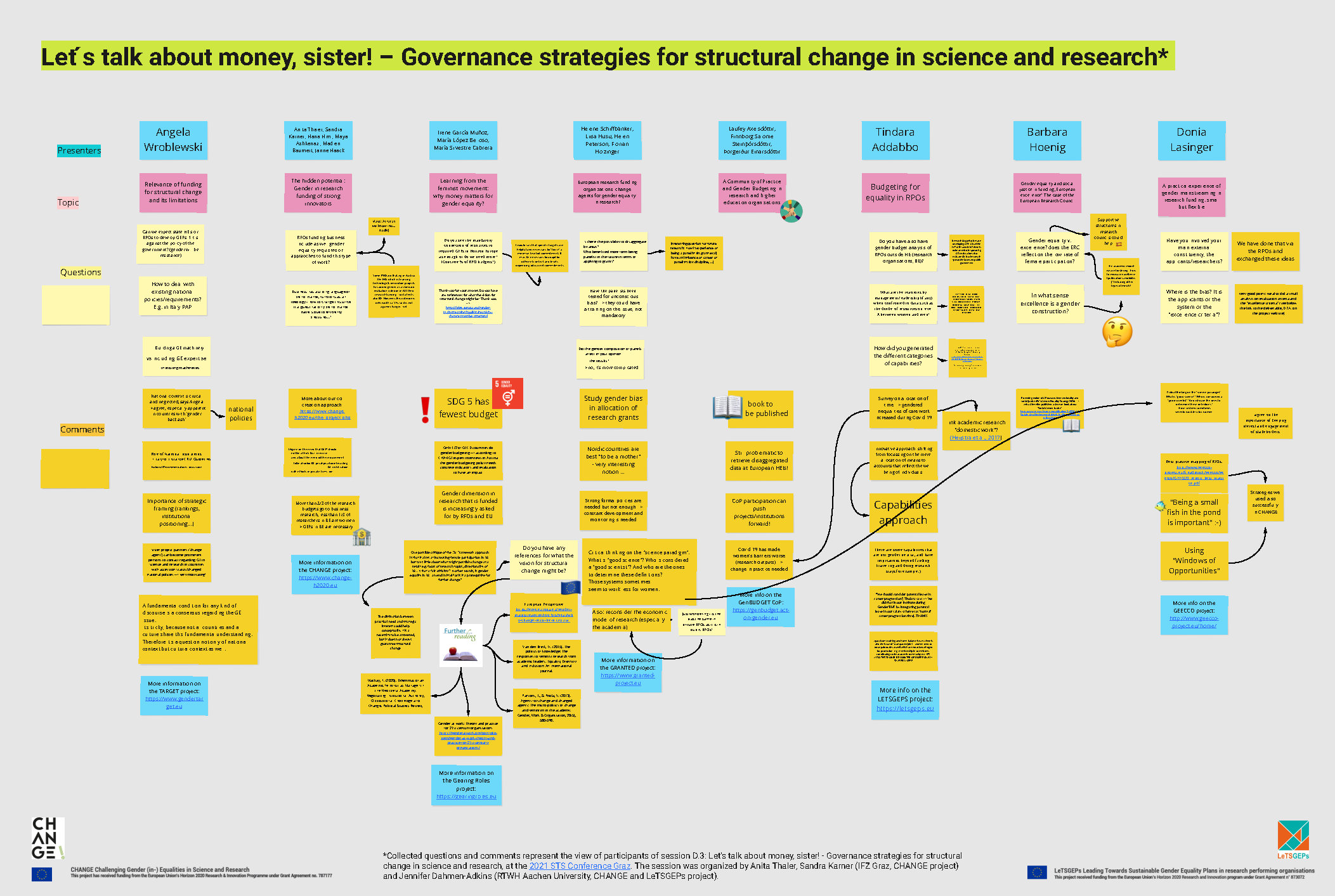"Let's talk about money, sister!"
The upcoming research funding programme ‘Horizon Europe' will make GEPs an eligibility criterion of proposals. This is one example of a governance strategy where the allocation of (monetary) resources — in terms of funding — is linked to fostering gender equality in European science and research organisation. In a session at the annual STS conference dedicated to this very topic our CHANGErs Anita Thaler, Sandra Karner (IFZ, Austria) and Jennifer Dahmen-Adkins (RWTH Aachen, Germany) invited gender researchers to co-create knowledge about how financial governance strategies can be used to provide incentives to encourage research performing and funding organisations to become more inclusive and gender equal work places, and moreover to change the whole science and research system towards more fairness and gender equity.
Eight excellent papers have been presented and discussed:
- Relevance of funding for structural change and its limitations by Angela Wroblewski (Institute for Advanced Studies, IHS, Austria)
- The hidden potential: Gender in research funding of strong innovators by Anita Thaler & Sandra Karner (Interdisciplinary Research Centre for Technology, Work and Culture, Austria), Hana Himi & Maya Ashkenazi (Beit Berl Academic College, Israel), Madlen Baumert & Janne Haack (Fraunhofer Institute for Manufacturing Technology and Advanced Materials Bremen, Germany)
- Learning from the feminist movement: why money matters for gender equality? By lrene Garcia Muiioz, Maria Lopez Belloso, Maria Silvestre Cabrera (University of Deusto, Spain)
- European research funding organizations: change agents for gender equality in research? By Helene Schiffbänker1, Liisa Husu2, Helen Peterson2, Florian Holzinger1 (1Joanneum Research, Austria; 2Örebro University, Sweden)
- A Community of Practice and Gender Budgeting in research and higher education organisations by Laufey Axelsdóttir, Finnborg Salome Steinþórsdóttir, Þorgerður Einarsdóttir (University of lceland, lceland)
- Budgeting for equality in RPOs by Tindara Addabbo (University of Modena & Reggio Emilia, ltaly)
- Gender equality and social justice in funding ,European excellence': The case of the European Research Council by Barbara Hoenig (University of Graz, Austria)
- A practical experience of gender mainstreaming in research funding: small but flexible by Donia Lasinger (Vienna Science and Technology Fund, Austria)
27 participants, many of them involved in sister projects of CHANGE (TARGET, Gearing Roles, GRANteD, ACT, LeTSGEPs, GEECCO), exchanged and co-created knowledge.
Central discussion points addressed were
- There is a lack of gender policies for business research, where the majority of research budgets are allocated but fewer gender equality exists than in the more regulated higher education sector (concerning gender policies).
- The integration of GEPs into Horizon Europe requirements as window of opportunity to change not only academic but also industrial research towards more gender equity.
- Ambitious goals and also strong formal policies are needed but they are not enough, policies need budgets to become practices (for instance the Sustainable Development Goal nr. 5 on gender equality has the lowest budget). And policies need constant further development and monitoring.
- The economic model of research must be reconsidered (especially in academia). Critical thinking on the "science paradigm". What is "good science"? Who is considered a "good scientist"? And who are the ones to determine these definitions? Those systems sometimes seem to work less for women.
- An innovative approach would be shifting from focussing on the mere allocation of means to accounts that reflect the well-being of individuals (including matters of care).
In the upcoming GENDERACTION Final Event, gender in science and research policies will be discussed further (Save the date: 8-9 July 2021, online)!
